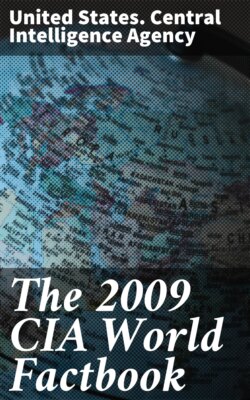Читать книгу The 2009 CIA World Factbook - United States. Central Intelligence Agency - Страница 219
На сайте Литреса книга снята с продажи.
44 00 N, 18 00 E
ОглавлениеMap references:
Europe
Area:
total: 51,197 sq km country comparison to the world: 128 land: 51,187 sq km
water: 10 sq km
Area - comparative:
slightly smaller than West Virginia
Land boundaries:
total: 1,538 km
border countries: Croatia 932 km, Montenegro 249 km, Serbia 357 km
Coastline:
20 km
Maritime claims:
no data available
Climate:
hot summers and cold winters; areas of high elevation have short, cool summers and long, severe winters; mild, rainy winters along coast
Terrain:
mountains and valleys
Elevation extremes:
lowest point: Adriatic Sea 0 m
highest point: Maglic 2,386 m
Natural resources:
coal, iron ore, bauxite, copper, lead, zinc, chromite, cobalt, manganese, nickel, clay, gypsum, salt, sand, forests, hydropower
Land use:
arable land: 19.61%
permanent crops: 1.89%
other: 78.5% (2005)
Irrigated land:
30 sq km (2003)
Total renewable water resources:
37.5 cu km (2003)
Natural hazards:
destructive earthquakes
Environment - current issues:
air pollution from metallurgical plants; sites for disposing of urban waste are limited; water shortages and destruction of infrastructure because of the 1992–95 civil strife; deforestation
Environment - international agreements:
party to: Air Pollution, Biodiversity, Climate Change, Climate Change-Kyoto Protocol, Desertification, Hazardous Wastes, Law of the Sea, Marine Life Conservation, Ozone Layer Protection, Wetlands
signed, but not ratified: none of the selected agreements
Geography - note:
within Bosnia and Herzegovina's recognized borders, the country is divided into a joint Bosniak/Croat Federation (about 51% of the territory) and the Bosnian Serb-led Republika Srpska or RS (about 49% of the territory); the region called Herzegovina is contiguous to Croatia and Montenegro, and traditionally has been settled by an ethnic Croat majority in the west and an ethnic Serb majority in the east
People ::Bosnia and Herzegovina
Population:
4,613,414 (July 2009 est.) country comparison to the world: 119
Age structure:
0–14 years: 14.5% (male 344,760/female 323,303)
15–64 years: 70.7% (male 1,645,274/female 1,617,136)
65 years and over: 14.8% (male 279,781/female 403,160) (2009 est.)
Median age:
total: 39.8 years
male: 38.7 years
female: 41 years (2009 est.)
Population growth rate:
0.339% (2009 est.) country comparison to the world: 172
Birth rate:
8.85 births/1,000 population (2009 est.) country comparison to the world: 214
Death rate:
8.63 deaths/1,000 population (July 2009 est.) country comparison to the world: 89
Net migration rate:
3.17 migrant(s)/1,000 population (2009 est.) country comparison to the world: 28
Urbanization:
urban population: 47% of total population (2008)
rate of urbanization: 1.4% annual rate of change (2005–10 est.)
Sex ratio:
at birth: 1.07 male(s)/female
under 15 years: 1.07 male(s)/female
15–64 years: 1.02 male(s)/female
65 years and over: 0.69 male(s)/female
total population: 0.97 male(s)/female (2009 est.)
Infant mortality rate:
total: 9.1 deaths/1,000 live births country comparison to the world: 155 male: 10.44 deaths/1,000 live births
female: 7.67 deaths/1,000 live births (2009 est.)
Life expectancy at birth:
total population: 78.5 years country comparison to the world: 43 male: 74.92 years
female: 82.34 years (2009 est.)
Total fertility rate:
1.25 children born/woman (2009 est.) country comparison to the world: 212
HIV/AIDS - adult prevalence rate:
less than 0.1% (2007 est.) country comparison to the world: 165
HIV/AIDS - people living with HIV/AIDS:
900 (2007 est.) country comparison to the world: 143
HIV/AIDS - deaths:
100 (2001 est.) country comparison to the world: 149
Nationality:
noun: Bosnian(s), Herzegovinian(s)
adjective: Bosnian, Herzegovinian
Ethnic groups:
Bosniak 48%, Serb 37.1%, Croat 14.3%, other 0.6% (2000)
note: Bosniak has replaced Muslim as an ethnic term in part to avoid confusion with the religious term Muslim - an adherent of Islam
Religions:
Muslim 40%, Orthodox 31%, Roman Catholic 15%, other 14%
Languages:
Bosnian, Croatian, Serbian
Literacy:
definition: age 15 and over can read and write
total population: 96.7%
male: 99%
female: 94.4% (2000 est.)
Education expenditures:
